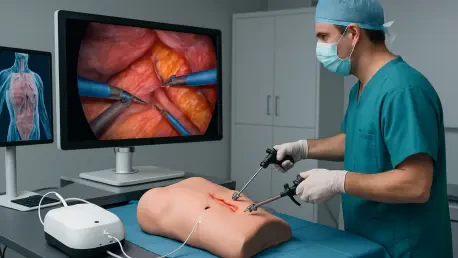In a groundbreaking move for the medical field, two industry leaders have joined forces to redefine how surgeons are trained for minimally invasive procedures across Europe and beyond. Fujifilm Healthcare Europe, a titan in imaging technology, has partnered with IRCAD France, a world-renowned research and training institute based at the University of Strasbourg. This collaboration focuses on integrating cutting-edge ultrasound systems and 3D surgical planning tools into educational programs designed to elevate surgical precision and patient safety. By combining technological innovation with clinical expertise, this alliance promises to equip surgeons with the skills and tools necessary to navigate complex procedures with greater confidence. The emphasis on accessible training, both in-person and online, ensures that a wide range of medical professionals can benefit from these advancements, setting a new benchmark for surgical education in an era where technology plays an increasingly vital role.
Revolutionizing Surgical Education with Technology
The core of this partnership lies in transforming surgical training through advanced technological integration. Fujifilm’s state-of-the-art ultrasound systems and Synapse 3D software are being incorporated into IRCAD’s renowned educational frameworks, offering surgeons unparalleled opportunities to refine their skills. These tools allow for detailed anatomical visualization and procedural rehearsals on digital organ models before stepping into the operating room. Such preparation is invaluable for minimally invasive surgeries, where precision is paramount to minimizing patient trauma and accelerating recovery times. The ability to simulate real-world scenarios using 3D planning technology means that surgeons can anticipate challenges and optimize their approaches, ultimately enhancing outcomes. This initiative reflects a broader shift in the medical field toward leveraging digital solutions to bridge the gap between theoretical knowledge and practical application, ensuring that trainees are better prepared for the complexities of modern surgery.
Beyond the immediate benefits of hands-on experience, this collaboration also prioritizes accessibility to ensure widespread impact. Training programs are being developed in both physical and virtual formats, breaking down geographical barriers and enabling surgeons from diverse regions to participate. This dual approach not only democratizes access to high-quality education but also fosters a global community of medical professionals equipped with the latest techniques. Additionally, the integration of artificial intelligence into these tools is being explored to further enhance decision-making capabilities during surgeries. By focusing on risk mitigation and predictive analytics, the partnership aims to set new standards in surgical safety. This forward-thinking strategy underscores the commitment to not just meeting current needs but anticipating future challenges in healthcare, positioning both organizations at the forefront of medical innovation and education.
Synergy of Expertise Driving Innovation
A defining strength of this collaboration is the unique blend of industry know-how and clinical insight. Fujifilm Healthcare Europe brings nearly a century of expertise in imaging technology, providing robust tools that have long supported medical diagnostics and interventions. Meanwhile, IRCAD contributes its deep-rooted experience in minimally invasive and robotic surgery, honed over decades of pioneering research and training. This synergy creates a powerful platform for developing ultrasound solutions tailored to the real-world needs of surgeons. Feedback from clinicians directly informs product enhancements, ensuring that the technology evolves in tandem with practical demands. The shared vision is clear: to create tools that not only support existing surgical techniques but also pave the way for future advancements through collaborative research, ultimately benefiting both practitioners and patients.
This partnership also highlights the importance of user-centered design in medical technology. By fostering an environment where surgeons can test and provide input on Fujifilm’s systems during training, the collaboration ensures that innovations are grounded in clinical reality. Joint research initiatives are expected to yield breakthroughs in how imaging technology can be applied to complex procedures, potentially redefining best practices. The mutual dedication to pushing boundaries is evident in the ambitious projects already underway, which aim to integrate emerging technologies into surgical workflows. This approach not only addresses current challenges but also anticipates the evolving landscape of surgery, ensuring that both organizations remain leaders in their respective fields. The result is a dynamic partnership that prioritizes practical impact over mere technological novelty, setting a precedent for how industry and academia can work together to advance healthcare.
Building a Future of Enhanced Patient Care
Looking back, the alliance between Fujifilm Healthcare Europe and IRCAD France marked a pivotal moment in the evolution of surgical training. The integration of advanced ultrasound and 3D planning technologies into educational programs offered a transformative approach to skill development, equipping surgeons with tools to improve precision and safety. Reflecting on this collaboration, it became clear that the focus on accessible training and innovative research had already begun to reshape how medical professionals prepared for complex procedures. The commitment to blending technological prowess with clinical expertise laid a strong foundation for meaningful advancements, with tangible benefits observed in operating rooms across regions.
Moving forward, the emphasis should remain on expanding these training initiatives to reach even more surgeons worldwide, ensuring that the benefits of enhanced education translate into improved patient outcomes. Stakeholders are encouraged to invest in scaling up virtual platforms, which proved instrumental in broadening access. Additionally, continued exploration of artificial intelligence and other emerging technologies could further refine surgical practices, offering predictive insights that enhance decision-making. This partnership set a powerful example of what can be achieved through collaboration, and the next steps involve sustaining this momentum to address future healthcare challenges with innovative, clinician-driven solutions.









